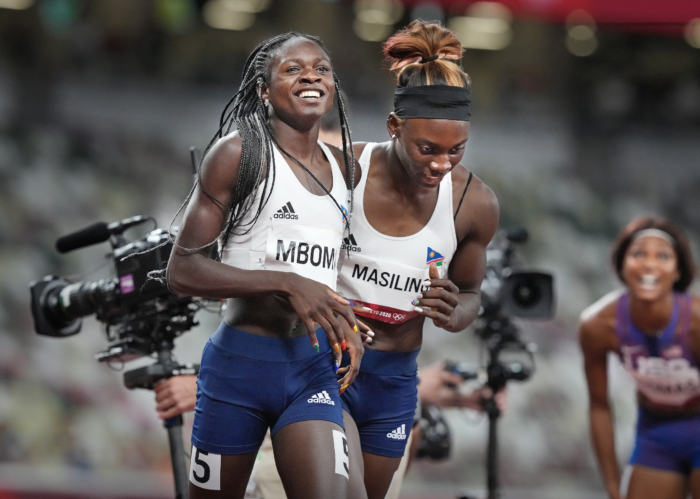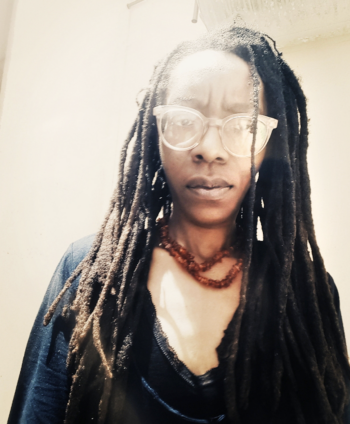
Olympic rules in colonial tracks
Beatrice Masilingi and Christine Mboma were the fastest in the world, yet they were stopped from competing in the 400 meters at the Olympics in Tokyo. »History suggests that the Namibian girls and their supporters should brace themselves for an oncoming war.«
At just 18 years of age, Namibian sprinters Christine Mboma and Beatrice Masilingi hold some of the fastest world records for the women’s running category. In April 2021 Masilingi won the unofficial world record title as the third-fastest woman in the Under-20 Championships.
A day later, Mboma broke Masilingi’s and the world record, earning her the spot as the 7th fastest on the all-time women’s 400 m list. Their mounting achievements caught the attention of World Athletics, the main governing body of athletics. Just ahead of the 2021 Olympic Games in Tokyo – to where they were undoubtedly headed – the teenagers thus became the latest targets for testosterone testing.
They were then classified with »Differences in Sexual Development« (DSD) due to hyperandrogenism or elevated levels of the testosterone hormone. Formerly known as the International Association of Athletics Federation (IAAF), World Athletics barred them from certain women’s events, including their preferred 400m, claiming their testosterone levels give the teenagers an undue advantage.
In recent decades, IOC and World Athletics, which profiles female athletes at its discretion, have built a track record targeting and policing female athletes from the Global South.
Misogyny was a key cornerstone of the Olympics since its inception in 1896 and no female participation was allowed until 1900. Afterwards, women continued to be unfairly constrained within patriarchal and sexist confines.
By 1968 part of the red scare propaganda was that »Soviet male athletes would compete as females to increase the Communist medal count.« This helped inform the decision by the International Olympics Committee (IOC) to introduce sex testing that year.
No communist imposters were found, but women continued to be regulated under the perpetual threat of exclusion from sports. Sex testing – which targets only women – has undergone a series of reforms, all of them consistently dehumanizing with the introduction of testosterone testing in 2011 being the latest.
In recent decades, IOC and World Athletics, which profiles female athletes at its discretion, have built a track record targeting and policing female athletes from the Global South – with the ever-increasing persecution of women classified with DSD and/or intersex women.
After testing, the women hardly get a chance to process this surprising news impacting their sense of identity and careers, privately. With no regard to their life or safety, their private medical information is passed to the media for public consumption.
India saw a number of careers derailed or destroyed by IAAF. In 2014, 18-year-old Dutee Chand – who would later also trailblaze as India’s first openly gay athlete when she came out as a lesbian in 2019 – was banned from the tracks after great personal and national achievements.
Their elite athleticism and identities also challenged whiteness’ very concepts of what womanhood, sex and gender are supposed to be and look like.
She successfully fought an appeal with the Court of Arbitration for Sports (CAS) citing a lack of scientific evidence linking high testosterone levels to enhanced performance.
With the hyperandrogenism policy suspended, the ban was also lifted for the world to witness South Africa’s Caster Semenya, Francine Niyonsaba of Burundi and Kenya’s Margaret Wambui fairly and gracefully, respectively win gold, silver and bronze in the 800m women’s distance.
On the world’s biggest athletic podium, it was a first in history for three darker-toned African woman sprinters to hold the top spots in the running category together. Their elite athleticism and identities also challenged whiteness’ very concepts of what womanhood, sex and gender are supposed to be and look like.

In 2018 the IAAF returned with new eligibility rules and a lowered testosterone threshold for women. Those classified with DSD were henceforth barred from certain events – usually, the ones they preferred and for which they had vigorously trained – unless they reduce their testosterone levels via medical interventions.
Recommending that women medically alter their bodies solely to fit a sports category raises serious concerns about consent, invasion of privacy, the right and ability to earn an income etc including ethics around sports in general.
Though most of the targeted athletes refuse to medically alter their bodies, Uganda’s Athlete of the Year 2011 Annet Negesa, with the hope of soon returning to the beloved tracks was coerced into medical intervention. Instead of the simple injection that she expected, a gonadectomy – surgery to remove internal testes – was performed without her informed consent.
She was also denied adequate post-surgery care and afterwards suffered from joint problems, weak knees, and the inability to stand painlessly for long periods of time.
When Semenya went on to appeal the ban, CAS defended it as a »necessary, reasonable and proportionate means of achieving the IAAF’s aim of preserving the integrity of female athletics.« After the Tokyo Games, World Athletics suddenly unveiled that the study they had commissioned in 2017 that linked elevated testosterone levels to enhanced performance was »potentially misleading.«
The regulating body also boldly suggested that the study, which was questioned by several experts in the past had »no bearing« on its own research. Indeed, the regulations are »here to stay,« says President of World Athletics, Sebastian Coe, who after Mboma’s spectacular Olympic achievement, reiterated the need »to crack down on women who have naturally elevated hormone levels«.
Mboma had just won her first Olympic silver medal and set a new under-20 woman record, this time running in the 200m category. Instead, World Athletics announced a new framework that will include more focus on safety.
With black women already often portrayed and perceived by those in power as a threat deserving of oppression, the framing of »the importance of safety« from a racist, cissexist and transphobic institution feels more alarming than comforting. The chances of this adversely affecting intersex, gender-variant and trans people are high.
»White supremacy stands in direct opposition to the wellbeing and ways of Africans«
»The Olympics are in many ways a microcosm of world relations. We see inter-imperialist rivalries, hyper-nationalism, exploitation, and ongoing oppression on display,« writes Shane Riggins. Across the nation, Namibians proudly celebrated Mboma and Masilingi’s every triumph. Walls of defence against anyone who dared question the womanhood of »our golden girls« appeared across media, whether on radio, in the papers or in social media comments.
The display of support for the girls was beautiful to witness and to be a part of, even to someone like me, who is largely opposed to the neocolonial construct of nationhood. However, to bring an end to interactive, harmful systems, we will also have to transform that energy into real solidarity movements where we connect various struggles, analyze their overlaps, differences and many similarities.
African academic feminists like Stella Nyanzi, Oyèrónkẹ́ Oyěwùmí and Sylvia Tamale form part of those who have critically analyzed how colonialism and coloniality distorted our pluralistic, more inclusive African communities, in which gender functioned – when it held any function at all – differently from the social and capitalist construct of the West.
Since the discrimination of African women in sports, therefore, also goes beyond the legal and often ineffective Western human rights scope it should be met with the intensified feminist, indigenous and anti-colonial resistance that this type of cultural neocolonialism requires.
Up to date, at least seven African women are known to have been restricted by the eligibility rules. For over a decade, Semenya has resisted World Athletics and their ongoing violent denial to let her fulfil her passion and make a living as who she is.
History suggests that the Namibian girls and their supporters should brace themselves for an oncoming war. Even though we have yet to see what these two young world-class athletes are truly capable of, they gloriously left their mark as serious contenders in the game in Tokyo and beyond. Unfortunately, public suggestions for stricter restrictions on athletes classified with DSD already emerged after their recent high achievements even outside their restricted categories.

White supremacy stands in direct opposition to the wellbeing and ways of Africans. As it stands, African women are not winning with the sex and gender binaries.
That is not to say that gendered sports cannot be enjoyed, but the harm resulting from it must be addressed, eliminated and alternatives, if necessary, found.
Meanwhile, after passing difficult barriers to even enter and compete in sports, women who are trans are branded as the ”real injustice” in women’s sports. However, the cruel twist of irony shows that under white cisheteronormative patriarchy, all women – trans or not- have to prove their womanhood to white cishet men.
Namibians and Africans, in general, can assist our champions’ struggle by, amongst other things, challenging the colonial binaries as often as we can.
On her incredible achievements, the Olympic medallist Christine Mboma simply says: »I just push and do my best.« Masilingi who was at first bewildered by the very strange decision to ban her and her compatriot says she is determined to fight for change.
Namibians and Africans, in general, can assist our champions’ struggle by, amongst other things, challenging the colonial binaries as often as we can.
Namupa Shivute is a genderqueer writer, griot and documentarian from Namibia.





